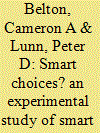| Srl | Item |
| 1 |
ID:
150652


|
|
|
|
|
| Summary/Abstract |
Participation in demand response (DR) may affect a consumer's electric consumption pattern through consumption load curtailment, a shift in the consumption timing or increasing the utilization of distributed generation (DG). This paper attempts to provide empirical evidence of DR's effect on DG adoption by household consumers. By using the original Internet survey data of 5442 household respondents in Japan conducted in January 2015, we focus on the effect of the time-of-use (TOU) tariff on the purchasing intention of photovoltaic systems (PV). The empirical results show the following: 1) current TOU plan users have stronger PV purchase intentions than the other plan users, 2) respondents who are familiar with the DR program have relatively higher purchase intentions compared with their counterparts, and 3) when the respondents are requested to assume participation in the virtual TOU plan designed for the survey, which resembles plans currently available through major companies, 1.2% of the households have decided to purchase PV. In addition, we provide calculations of TOU's impacts on the official PV adoption and emissions reduction targets, and discuss policy recommendations to increase recognitions and participations in TOU programs.
|
|
|
|
|
|
|
|
|
|
|
|
|
|
|
|
| 2 |
ID:
176729


|
|
|
|
|
| Summary/Abstract |
The introduction of smart technology and dynamic tariffs (such as time-of-use tariffs) provides multiple potential benefits for electricity markets. However, time-of-use tariffs generate additional complexity for consumer tariff choices in electricity markets. How well consumers can choose between tariffs, and whether certain tools improve these choices, are therefore important questions for energy regulators and policy makers. This paper presents an exploratory study that used experimental behavioural science to investigate consumer choice in electricity markets with time-of-use tariffs. A representative sample of consumers (n = 145) were given information about smart meters and time-of-use tariffs. A sequence of experimental tasks measured attitudes towards smart meters, comprehension of tariffs and quality of decisions between different types of electricity tariffs, where quality was judged against participants’ own perceptions of their electricity usage. The findings suggest that consumers struggle to match tariffs to usage accurately, with a general aversion to time-of-use tariffs that may lead to sub-optimal choices between tariff types. When participants chose between different priced time-of-use tariffs via an experimental price comparison site, decisions were significantly improved by a tool that personalised estimated costs. Policy implications include the importance of pre-testing interventions designed to improve consumer decisions.
|
|
|
|
|
|
|
|
|
|
|
|
|
|
|
|